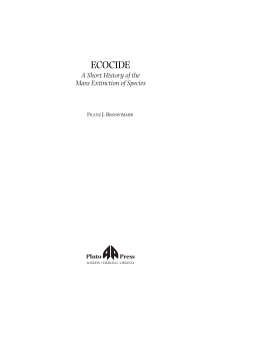
Additional Information
Book Details
Abstract
We live in an age of ecocide. Changes of enormous ecological significance are occurring on our planet - the ozone layer is beginning to disintegrate. Since 1970 the world's forests have almost halved. A quarter of the world's fish have been depleted.
70% of biologists believe the world is now in the midst of the fastest mass extinction of species in the planet's 4.5 billion-year history. Biodiversity loss is rated as a more serious environmental problem than the depletion of the ozone layer, global warming, or pollution and contamination. How have we come to this, and what can be done to conserve our environment for the future?
Ecocide examines the facts behind the figures to offer a disturbing account of the ecological impact that the human species has on the planet. It shows how we are wilfully destroying our world. Highlighting important countermovements who are working for ecological democracy, this unique book is essential for anyone who cares about conserving our environment for the future.
'Helps us choose to take collective responsibility. Essential reading for anybody who cares about the future of humanity and the diversity of species'
Vandana Shiva
Table of Contents
| Section Title | Page | Action | Price |
|---|---|---|---|
| Contents | vii | ||
| Tables | ix | ||
| Acknowledgements | xi | ||
| Introduction | 1 | ||
| The problem | 1 | ||
| Why bother? | 6 | ||
| Etiology of ecocide | 9 | ||
| Chapter outline | 10 | ||
| 1 The Human Odyssey: From Biological to Cultural Evolution | 12 | ||
| Beginnings | 12 | ||
| From Tree Shrews to Primates | 14 | ||
| Fire Use and Dietary Changes | 17 | ||
| The Rise of Modern Humans | 19 | ||
| The Megafauna Extinction | 22 | ||
| The Pivotal Role of Language | 27 | ||
| 2 Problematic Society-Nature Relations Before the Modern Era | 29 | ||
| The Neolithic Revolution | 29 | ||
| Ecological Blunders of Antiquity | 32 | ||
| 3 The Modern Assault on Nature: The Making of Ecocide | 54 | ||
| The Capitalist System: A Brief Historical and Sociological Overview | 54 | ||
| The Rise of Scientific and Technological Thinking | 56 | ||
| The Capitalist Ethos: Ecological and Social Values | 58 | ||
| Social and Ecological Implications of the fiColumbian Exchangefl | 59 | ||
| The Enslavement of Land and Nature | 60 | ||
| Early Modern Fur Trade | 62 | ||
| The Mass Slaughter of the North American Bison | 66 | ||
| The Rise of Commercial Whaling | 67 | ||
| 4 The Planet as Sacrifice Zone | 70 | ||
| The Enclosure of the Commons: A Global Phenomenon | 70 | ||
| The Industrial Revolution | 71 | ||
| Ecology and Modern Warfare | 72 | ||
| Ecocide and Modern Warfare | 74 | ||
| The Planet as National Sacrifice Zone | 77 | ||
| The Planet as Demographic Sacrifice Zone | 81 | ||
| 5 Ecocide and Globalization | 86 | ||
| The Impact of Globalism | 86 | ||
| Poverty and Ecocide | 88 | ||
| A Terminal Grand Buffet? | 91 | ||
| Ecocide and the Global Treadmill of Production | 93 | ||
| The Failure of Environmental Education | 95 | ||
| The Ideological Turn | 96 | ||
| The Currents of Ecological Democracy | 97 | ||
| The Imperatives of Ecological Democracy | 98 | ||
| Envisioning an Equitable Global Commons | 101 | ||
| Epilogue Living in the Age of Ecocide | 103 | ||
| Glossary | 106 | ||
| Tables | 119 | ||
| Selected bibliography | 179 | ||
| Notes | 141 | ||
| Index | 195 | ||
| absolutism, 56 | 56 | ||
| accountability, TNCs' lack of, 86 | 86 | ||
| acid rain 103 | 103 | ||
| Adams, Robert 37 | 37 | ||
| advertising 176n | 176 | ||
| Africa 19-20 | 19 | ||
| as origin of Homo sapiens, 19-20 | 19 | ||
| biodiversity hotspots, 84 | 84 | ||
| capita income, 88 | 88 | ||
| change, 14 | 14 | ||
| change, 16 | 16 | ||
| early hominids in, 13 | 13 | ||
| early hominids in, 145n | 145 |
